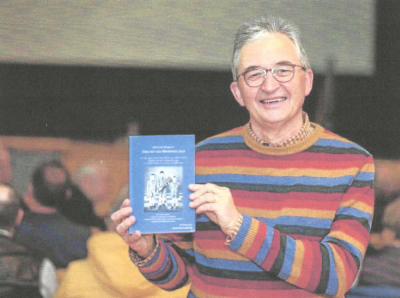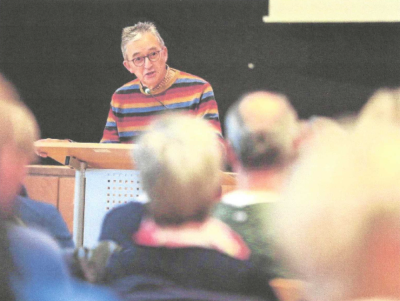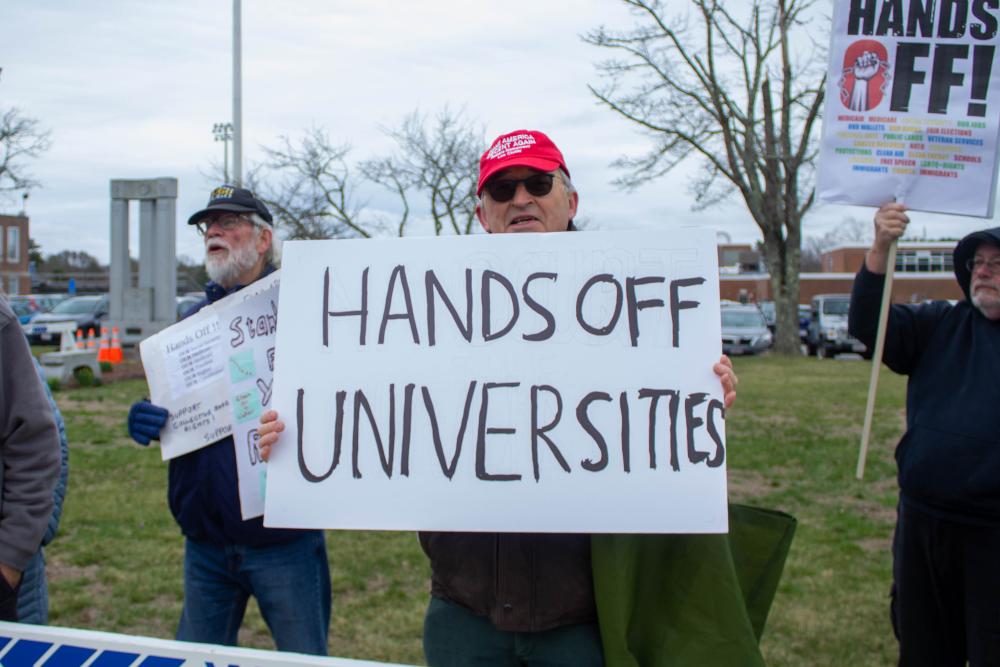Law and Democracy: Manfred Wiegandt’s American story



Manfred Wiegandt, a 68-year-old German-born immigration lawyer, sat at a small table near the entrance of his office on High Street. As he drew comparisons between President Donald Trump and right-wing extremists of the past, he was interrupted by a man knocking at the door.
“God bless you for your help with the immigration situation with my wife,” the man said. “God bless you sir, you’re a good man.”
Wiegandt returned to the table slightly flustered and quickly brushed off the praise — “I don’t even know why he says this. It doesn’t happen very often but it's nice to hear.”
Raised in Germany, Wiegandt moved to Wareham to marry Amy Gleason, after they had met in Germany through a friend of Gleason’s from Phillips Academy in Andover. She followed in the footsteps of her parents, both doctors — her father co-founded the Wareham YMCA — and became a doctor herself. Together, the couple raised three children, now in their late 20s and early 30s.
Although Wiegandt already held a law degree from a German university — when he arrived in America, he obtained a master's degree from Fletcher at Tufts and then an American law degree from Boston University. He also did a stint as a Visiting Fellow at the Harvard Law School Human Rights Program
Now he practices immigration law in Wareham, assisting people across New England who are navigating the U.S. immigration process — primarily those marrying U.S. citizens, seeking permanent residence for parents or children, or pursuing naturalization.
When he first started in American immigration law, Wiegandt — who speaks four languages fluently and has a working knowledge in two others — worked for Greater Boston Legal Services, assisting asylum seekers.
He recalled one story of helping a woman fleeing a war in her home country of Eritrea, another of a minister from the Congo arriving on a religious visa, a third of someone escaping Rwanda after warring factions attacked his family farm
“People flee out of desperation,” Wiegandt said. “It’s the same as our forefathers. Were our forefathers criminals?”
He said those who argue that everyone “should just come here legally,” don’t understand how the immigration process works. American immigration services prioritize individuals with high educational and career achievement, for them the line is short, he said.
For those with little or no education, the process can take 20 years, Wiegandt explained.
“If we had a decent program that allows people without education to come, maybe people would come more legally,” he said. “We don't have that, and they need to leave [home] now.”
The oldest of four children, three boys and one girl, Wiegandt remembers his hometown of Duisburg as an industrial hub and describes returning home in the evening under a sky turned red from factory furnaces.
As a child he shared a bedroom with his two younger brothers — “And at night time I would tell them stories where they were the protagonist.”
A published author several times over, his most recent book is a stark departure from children’s novels. It is a collection of articles originally written for a German legal quarterly called “Law and Politics.” The book, titled “Rule of Law and Democracy in America: The Decline of the Liberal Constitutional System in the United States,” was written for a German audience. It provides an overview of the major legal and political developments in the U.S. in recent years, particularly in relation to the Supreme Court, and explores the threat Trump poses to American democracy.
Wiegandt said German readers are aware of American political news, but not of the “detailed implications.”
“I mean, Americans don't know that either,” Wiegandt said with a laugh.
As an immigrant, an immigration lawyer, a constitutional expert and a German with relatives whose memories reach the second World War, Wiegandt's perspective on current American politics is unique and authoritative.
“Germans criticized America, but still, America was kind of a beacon you oriented to. And when you talked to my parents after the war, they always praised Americans.” Wiegandt said. “Why has a country that more or less stood for democracy and human rights absconded that?”
Wiegandt’s frustration with the direction of American politics has led him to attend several recent protests and help organize the activist group “Wareham for Law and Democracy.” A series of ads for the organization have run in Wareham Week.
His recent book points to the Supreme Court and the judicial system as catalysts for the erosion of the American democratic system.
“The immunity decision, I think this is the worst decision ever,” Wiegandt said, referencing a Supreme Court decision from July 2024 in which the court ruled that presidents have absolute immunity for acts committed as part of their main constitutional duties and are likely protected for other official actions.
The decision meant delays in several ongoing civil and criminal cases against Trump, including the Jan. 6, 2020 insurrection, and stronger cases for the defense.
“This really was a decision that destroyed the whole structure of the constitution,” he said. “Because you dissolve the checks and balances and give the president free hand to do what he wants. What is the limit now? The decision literally was a judicial coup d’état.”
When he's not engaging in political activism, Wiegandt can be found on the soccer field playing in the over 68 age group of the “Over the Hill Soccer League".
“We play soccer and we have a beer after. It's a great equalizer. You have people who have PhDs and you have people who have no degree. Those are your buddies,” he said.













